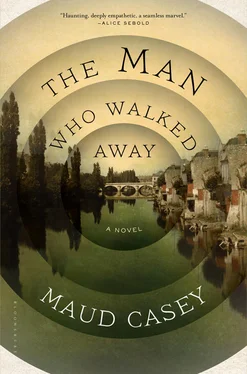“Finally,” Nurse Anne whispers to the Director. “Some relief from all that fucking . Go now, while you can.”
And off they go, marching down the birch-lined path: the Director leading the way, bearing his trowel like a scepter; then Marian, her face hidden by a hat and veil; then Walter, a head shorter than Marian, his arm looped through hers, to console her, he claims, though everyone knows it is she who consoles him; then Elizabeth, quick green eyes fierce and vigilant, scanning the world for a miracle; then Rachel, her hands smoothing her stomach to settle the impatient frog; and finally Samuel, his knobby frame drowning in the enormous coat he wears no matter the weather, frightened eyes drowning in his face, accompanied by Henri, a hand hovering at Samuel’s back. The group makes its way down the hill to the break in the bushes that marks the beginning of the path where, with the grand gesture of a discoverer laying claim, the Director swipes away a magnificent spiderweb with his trowel.
Samuel yelps — the poor spiders, ruined. They will have to start over from nothing.
“Of course, this is simply intuition and conjecture,” Walter is saying to Marian as he knees a waist-high fern out of the way in order to sidle up to her.
“Don’t disturb my hat,” she says.
“I’m trying to tell you something,” says Walter. “I am nowhere near your hat.”
“You are breathing on it,” says Marian.
“I am breathing out of the other side of my mouth,” says Walter. “What I’m trying to tell you is the very thought of the water has greatly increased my feeling of voluptuousness.”
“You are still breathing on my hat,” she says. “I feel you breathing on my hat.” How could she know that her lack of interest only increases his desire to tell her about the nature of his voluptuousness?
All the way to the creek, Walter attempts to capture it in words. “. . A softness inside of me, like rabbit fur, against my cheek but the inside of my cheek, a softness inside , not too furry, not choking fur, not a fir tree, for example, but expanding. .”
When they arrive on the narrow rocky bank, the Director says, “Don’t forget to take off your socks and your stockings as well as your boots.”
Marian has already unlaced her boots and unhitched her stockings, making her way carefully along the string of mossy rocks toward what the Director calls the tiny waterfall, the place where the creek bubbles up over a pile of larger rocks. She has left Walter on the bank, midsentence—“. . expanding out and out, but not in a bad way. I am full of. .”—but he is accustomed to this.
“Watchful reverence,” says the Director, ankle-deep in the creek. “This.” Using the trowel to gesture. “The leafy shadows of the trees, the cool water between your toes. That breeze. This is what we are here for. Samuel! Come into the water, Samuel.”
Samuel stands on the shore, dipping one trepidatious toe.
“Henri, come in. He’ll follow you.”
But everyone knows Samuel will not follow no matter how much Henri coaxes him.
“It is surely a divine miracle,” says Elizabeth, watching as her skirts float on the surface of the water. She leans over to push her floating skirts below the surface, where they wave silkily. “Ah, yes,” she says, her sleeves soaked and dripping. “Yes. Yes.” Another divine miracle. Her body is the site of divine miracles. Her face soiled with food? Divine miracle. A broken tooth? Divine miracle. Frostbitten feet? Divine miracle. She has no memory of bolting her food or banging her head against the table or putting her feet through the heavy bars of her window on a day so cold the trees were entombed in ice.
“Yes, Elizabeth,” the Director says. “Strange and wondrous, this life. You never solve its mystery. Close your eyes. Everyone, close your eyes. Pay attention.”
And they do, listening to this moment that smells like spring light. The songbirds: A phoebe? A wren? The wind rustles the leaves of a willow tree. Even when they cheat and open their eyes, this strange life remains mysterious — the light on the water, the silver, blue, green blur of dragonflies. Everyone held in the soft arms of quiet: Marian, who is afraid to be outdoors; Samuel, who is afraid of everything; even Rachel’s frog goes silent. Walter, in his increased voluptuousness, standing right here, is as real as the sound of the water running over the rocks and the silhouettes of the tree branches that cut the sky. But maybe the realness is just a dream he is having? Still, there is the relief of distraction and forgetting — he has forgotten the crackling noise he hears each night in the wall of his bedroom. For a moment, there is relief. There it is.
They are all fleetingly beautiful; they are all fleetingly of their hour. They are here and nowhere else.
“Nature,” the Director says, “is alive. It is where the visible and the invisible coexist. Watch with reverence, and you will see it.”
And then time begins again. The great shapeless mass of fear — the one that has followed Samuel since he was a boy — returns. His parents, so sure they could manage him themselves, but then he was no longer a boy. He grew and he was no longer so easily managed. If Samuel could describe it, he might describe it like this: a shadow growing longer and longer, until everything becomes shadow, erasing the borders of the world, erasing his borders, until everything is part of everything else. He blurs into the sky and the sky into the wind and the others are smeared into each other and into him. He feels himself spilling into the creek. What is himself ? There is nowhere to go to escape; he is already part of nowhere. Nowhere. The word fills him until he begins to shake. Nowhere. He stamps his feet in the creek to get the word out and the water splashes back. Nowhere. “I can’t,” he says. “It is too much.” Henri moves toward him swiftly, wrapping his arms around him from behind. Henri has worked long enough at the asylum to have mastered the rough art of restraint, but with Samuel he is gentle until there is no other choice.
“Sammy, you are fine. You are fine.”
“It is too much.” Samuel’s voice is a whisper through the trees. It is the rustle of the wind. “I can’t.”
Only the giant coat quiets him. “Here.” Henri pulls it closer around Samuel, holding him with it.
“We should go back,” Rachel says. She is the youngest and prone to weeping. When she begins to cry, Elizabeth moves away. Her own tears are a divine miracle. Rachel’s tears are contagious and disgusting.
“Shoes and socks, everyone,” the Director says.
“Samuel is too small for his emotions,” Elizabeth says, her wet skirts dragging heavily behind her until she is back on the bank where a magpie picks at the laces of her boot. “Look, a ’pie!” she shouts as it flicks its long pointed tail at her and flies off chattering.
“Only one of those is bad luck,” Marian says. “Two? A divine miracle.”
“How do you know there wasn’t another?” Elizabeth asks. “How do you know? Perhaps he had a more subtle companion.”
“Don’t worry about the dirt,” the Director says to Rachel, who is reluctant to sit on the ground because the frog disapproves. The frog would like to return to the asylum immediately and this makes putting her shoes back on difficult; its desire is an ache in her muscles.
“How kind, Elizabeth,” the Director says when she allows Rachel with her contagious tears to put a hand on her shoulder for balance. She is willing to risk infection if it means being touched.
“I, myself, am enlivened by a joyful spirit of hope,” Walter says, popping a blackberry into his mouth.
“Well, good, Walter, good,” the Director says, sounding relieved. “Very good.”
Читать дальше












